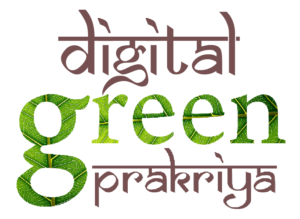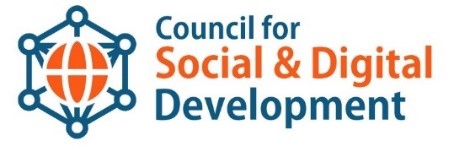Towards Digital Environmental Sustainability in India & South Asia through Digital Circular Economy and Society
ABOUT DIGITAL GREEN PRAKRIYA (DGP)
The Digital Green Prakriya / Processing (DGP) is the initiative to contribute to a sustainable digital circular social-economic-cultural-institutional ecosystem in India, a leading economy and society in Global South, with its enormous digital adoption, and integration across all sectors. The DGP is for a need based digital circular economy (DCE), particularly within the electronics sector, towards a framework that aims to create a sustainable balance between accelerating digital needs and environmental concerns. This through efficient lifecycle for electronic products and their components, while maximizing their value and minimizing environmental impacts. DGP seeks to combine the principles from the circular economy and digital technology to create a more resource-efficient and environmentally friendly electronics industry in India and South Asia.
DGP is a research, advocacy, implementation and training and capacity enhancement effort, since 2011, led by the Digital Empowerment Foundation (DEF) and partner agencies including Council for Social and Digital Development (CSDD).
OBJECTIVES OF DGP
- Advocate for sustainable circular economy policies and programmes at institutional, industry, government and community levels;
- Build networks of organisations for digital circular economy in India, South Asia and Asia-Pacific region;
- Undertake research and studies for greater and relevant evidence building for transformation change from linear to circular digital pathways;
- Design and implement digital circular economy process-oriented projects at various levels;
- Develop materials and resources in digital circular economy related elements for training, capacity building, advocacy and sharing.
DGP STRATEGY 2023-2026
Developing a 3-year strategy to promote a digital circular economy while balancing digital needs and environmental concerns requires a comprehensive approach that includes various aspects such as awareness building, collaboration, policy advocacy, technological innovation, and capacity building.
Under DGP, the focus is on the following:
Year 1: Foundation and Awareness
- Research and Analysis:
- Conducting studies and research with in-depth analysis of the current digital consumption patterns, environmental impacts, and existing initiatives related to the digital circular economy.
- Identifying key stakeholders, potential partners, and areas for intervention.
- Awareness Campaign:
- Launching a targeted awareness campaign to educate the public, businesses, and policymakers about the concept of a digital circular economy and its benefits for both digital and environmental sustainability.
- Utilising various communication channels, including social media, webinars, workshops, and partnerships with educational institutions.
- Stakeholder Engagement:
- Engaging with tech companies, e-waste recycling facilities, governmental agencies, and other relevant stakeholders to foster collaboration and gather insights for informed decision-making.
- Pilot Projects:
- Initiating small-scale pilot projects that showcase the principles of a digital circular economy, such as repairing and repurposing electronic devices, and promoting the use of open-source software.
Year 2: Collaboration and Innovation
- Partnerships:
Establishing partnerships with tech companies, environmental organizations, academic institutions, and local communities to pool resources and expertise in promoting digital circularity.
- Policy Advocacy:
- Working with policymakers to advocate for regulations that incentivize eco-design, e-waste management, and the development of sustainable digital technologies.
- Providing evidence-based research and case studies to support policy proposals.
- Innovation and Research:
- Collaborate with research institutions and tech companies to develop innovative solutions that promote repairability, modularity, and longevity of digital devices.
- Support research on energy-efficient computing, sustainable data centers, and recycling methods for electronics.
- Capacity Building:
- Organize workshops, training programs, and hackathons to empower individuals and businesses with the skills needed to embrace digital circularity.
- Create a network of repair and refurbishment centers to extend the lifespan of electronic devices.
Year 3: Scaling and Impact
- Scaling Up:
- Expand successful pilot projects into larger initiatives with a wider geographical reach.
- Collaborate with governments, businesses, and international organizations to replicate and scale effective strategies.
- Public-Private Partnerships:
- Forge partnerships with tech giants, retailers, and e-commerce platforms to integrate circularity principles into their business models and product offerings.
- Measurement and Reporting:
- Develop a set of metrics to measure the impact of the organization’s efforts on digital circularity and environmental sustainability.
- Regularly report progress to stakeholders, donors, and the public to maintain transparency and accountability.
- Global Engagement:
- By year 3, participate in major international conferences, forums, and networks focused on digital sustainability to share insights, learn from others, and contribute to the global dialogue.
- Policy Influence:
- Continue to engage with policymakers to refine and strengthen regulations that support the digital circular economy.
- Advocate for the integration of circular economy principles into broader sustainability agendas.









